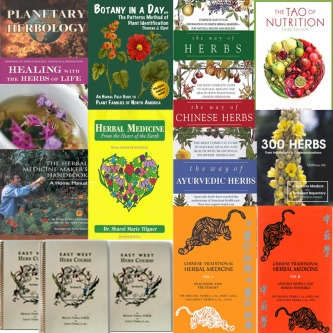Why is the Herbalist Certification School’s Reputation so Important?
The East West Herb School grants its Professional Herbalist and Clinical Herbalist graduates a Certificate of Completion.
The Herb School industry does not have a unified accreditation body. Therefore, NO herb school can grant its graduates an accredited herbalist degree, or an herbalist masters degree.
In the United States, for example, The Liaison Committee on Medical Education and the Commission on Osteopathic College Accreditation grant accreditation to educational institutions. These educational bodies are thereby entitled to bestow the M.D. (Doctor of Medicine) and D.O. (Doctor of Osteopathic Medicine) upon their graduates.
An Herbalist Masters Degree is a marketing term. Do not be misled by false advertising.
Potential herbalist employers know that an “Herbalist Masters Degree” is a marketing term. They will rely on a student’s Herbalist Certification school, and the reputation of that school amongst the healing community to assess the graduate’s potential fit with the employer’s healing model.
How to Get an Herbalist Certification
The East West Herb School offers a Certificate of Completion to students finishing each herbal course. When selecting an herbal training, if you base your decision on an advertised herbalist accreditation certification, promise of an herbalist degree, credential of master herbalist’s degree, or other such authorizations, know that there is no legal recognition in the United States for these titles.
The most an herb school or course can legitimately provide is a certificate of completion in their course, irrespective of content. This is what the East West Course presently offers its USA graduates.
Students who are investigating different distance-learning or on-site herbal schools should not be misled by false claims of herbalist accreditation or master herbalist degrees that ultimately mean nothing in terms of legal status in the USA.
The East West School of Herbology encourages all students to carefully document and record any and all herbal or related studies they experience and keep records of all cases they treat with herbs, professional or otherwise. This may be important for any future accrediting or licensing of herbalists in the USA. For now, consider this course of study:
- Energetic Herbal Assessment and Treatment
- Materia Medica
- Principles of Herbal Remedy Formulation
- Anatomy and Physiology
- Pathology and Disease
- Practical Clinical and Diagnostic Skills
- Practical Clinical Experience
The herbal industry is the fastest growing branch of the multi-billion dollar a year alternative health movement. Individuals who are skilled in the complexities of clinical herbal medicine are needed in all branches of this industry.
Many herbalists and students of herbal medicine are able to work with licensed practitioners in offering herbal alternatives and solutions to patients. Others may work as private herbal consultants using herbs to enhance general health and well-being. Both may be done if refraining from diagnosing and treating disease and instead using traditional and ancient healing modalities such as Traditional Chinese Medicine (TCM) or Traditional Ayurvedic Medicine (TAM).
The East West School of Herbology prides itself in offering students the most comprehensive combination of credibility, networking, and learning opportunities.
This includes the study of traditional diagnostic skills based on observation, palpation, listening and interrogation, basic western sciences and clinical experience.
Do not be deceived by false claims and advertisements. Certainly the majority of schools have something to offer. The goal of the East West School of Herbology is to be at the forefront of establishing a comprehensive training curriculum in the three major systems of herbal medicine: Western Herbal Medicine, Chinese Herbal Medicine, and Ayurvedic Herbal Medicine. East West offers practical herbalist training that is at once comprehensive, affordable and structured for all levels of interest and commitment.
How to Become a Registered Herbalist
The American Herbalist Guild (AHG) confers the Registered Herbalist (RH) status upon professional herbalists who meet a number of requirements. The Registered Herbalist enjoys increased credibility, networking and learning opportunities. Michael Tierra helped create the AHG’s Registered Herbalist standards.
The applicant must show proficiency in these areas:
- Materia Medica
- Therapeutic Framework
- Practice Management and Ethics
- Basic Sciences
- Academic Experience
- Clinical Experience
The descriptions here are just a partial list of requirements. The AHG maintains the entire application process, which you can read about in the Registered Herbalist Application Guide and the Registered Herbalist Application.
NOTE: GO TO THE AHG WEBSITE to get the latest versions of the guide and application!
Materia Medica: Demonstrate knowledge of at least 150 plants, including traditional uses, therapeutic actions, dosing, contraindications.
Therapeutic Framework: Demonstrate knowledge of herbal treatment theoretical foundations; demonstrate the ability to conduct a comprehensive case intake and assessment.
Practice Management and Ethics: Understand limitations and practice scope; ability to refer and to consult with other health professionals.
Basic Sciences: Understand anatomy, physiology and plant chemistry.
Academic and Clinical Experience: At least 4 years of academic training as well as clinical experience are required
Academic Training: Demonstrate knowledge of anatomy, physiology, pathology, biochemistry, medical terminology, nutrition, botany, plant identification.
Clinical Requirements: At least 2 years of clinical herbalist experience.

[do_widget id=text-30]
[do_widget id=text-31]
[do_widget id=text-32]
[do_widget id=text-34]
[do_widget id=text-35]
